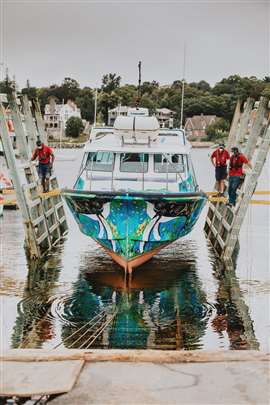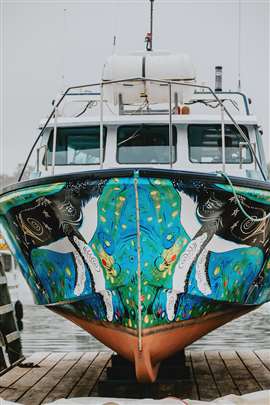Electrification makes fishing boats more sustainable
19 June 2023
Across the globe, the marine industry is moving toward decarbonization, replacing diesel engines with electric power. This strategy is proving especially effective for smaller vessels.
 Glas Ocean Electric’s lithium-ion battery-powered electric motor kit being demonstrated in the conversion of a 15-ton prototype vessel. (Photo: Danfoss Editron)
Glas Ocean Electric’s lithium-ion battery-powered electric motor kit being demonstrated in the conversion of a 15-ton prototype vessel. (Photo: Danfoss Editron)
“Huge vessels such as cruise ships get much attention when it comes to emissions reduction. Small working boats tend to be overlooked in this regard, yet there are so many of them that they can collectively make a huge negative impact on air quality and the marine environment,” said Sue Molloy, founder and president of Glas Ocean Electric (GOE). “Our goal is to help reduce those impacts in a way that makes financial sense, too.”
GOE is among the companies developing technology to enable decarbonization of these small boats. Its new lithium-ion battery-powered electric motor kit is designed to be easily installed in new or retrofitted in existing vessels. The kit allows vessels to mainly run on electric power yet maintain the ability to switch to diesel when greater power is needed, such as when moving out to a fishing area or returning home in the evening, GOE explained.
Molloy and her team developed the new electric propulsion system based on a 135-kW Danfoss Editron electric motor and ED-DT250 controller system. The Editron system includes a liquid-cooled, brushless permanent magnet motor and a full-featured digital signal processor controller. According to Danfoss Editron, it provides up to 95% efficiency and includes the torque multiplying function of a single-speed transmission and proprietary software that optimally controls each individual drivetrain component.
Small and light
To create its new electrical propulsion system, GOE built components and created the design to integrate an electric battery with the motor. Small size and weight for both were vital to GOE’s kit design, as the system had to fit into the existing footprint under the deck and not add too much weight to the boat, Molloy noted. The diesel engine and electric prolusion system share a shaft but otherwise function completely separately.
The Editron system proved to be half the size and a third lighter than the incumbent motor. According to Molloy, these characteristics were highly significant to meeting the project’s goals.
Also significant was Danfoss Editron’s expert support through the kit’s development. “If they had just sold us the motor and went away, this project would not have worked. We needed to customize the operation of the motor to see how it would best work in the system we were creating,” Molloy said.
“As we were machining new components and breaking new ground, we had many questions about how their motors might work with other components and in certain situations. For example, how would the motor react when going from full forward to full reverse, something you might need to do in a boat but never in a car. Danfoss Editron’s experts were very responsive and always provided smart, helpful, detailed answers.”
 Alan Syliboy, a prominent Mi’kmaw artist, was selected to decorate the Alutasi with a vibrant design that draws attention to the region and the boat’s environmentally friendlier mode of operation. (Photo: Danfoss Editron)
Alan Syliboy, a prominent Mi’kmaw artist, was selected to decorate the Alutasi with a vibrant design that draws attention to the region and the boat’s environmentally friendlier mode of operation. (Photo: Danfoss Editron)
The company provided assistance on the regulatory side, as well, helping GOE perform the safety and performance testing required to gain necessary approvals from regulatory bodies such as Transport Canada.
Emissions and noise reductions
Based on data GOE collected on the impacts of small boats on the marine environment, including the distances they travel daily and how they use power, electrification with its propulsion system can reduce a boat’s greenhouse gas emissions by 40%, said Molloy.
Electrification also eliminates the noise and vibrations typically generated by diesel engines, which can enable better communication among fishers, reduced rates of hearing loss and less fatigue, she pointed out. The reduction in boat noise is also expected to reduce stress on surrounding sea life.
“We made the system as quiet as possible, using a belt system instead of a chain system,” said Molloy. “We have seen a reduction in underwater radiated noise pressure of upwards of 80%.”
The electrical propulsion system is currently being demonstrated in the conversion of a 15-ton prototype vessel owned by Sma’knis, a company led by a member of the indigenous Mi’kmaw community of Canada’s Atlantic Provinces located in the Halifax area. Named Alutasi – “Fishing Guide” in the native language – the vessel is the first electric hybrid coastal passenger vessel approved to carry lithium-ion batteries by Transport Canada, Danfoss Editron pointed out.
With the Alutasi successfully in operation, GOE has set its sights on proactive expansion, as interest in the electrification kits from boat manufacturers and operators is expected to accelerate quickly.
“Once we get the kits in mass production, I hope to see around 2,000 boats with the system in two years, rising to potentially 10,000 in five years,” Molloy forecast. “If we can convert 15,000 boats to hybrid-electric operation, we can drop emissions in the region by some 400,000 tons of CO2 a year.”
STAY CONNECTED




Receive the information you need when you need it through our world-leading magazines, newsletters and daily briefings.
POWER SOURCING GUIDE
The trusted reference and buyer’s guide for 83 years
The original “desktop search engine,” guiding nearly 10,000 users in more than 90 countries it is the primary reference for specifications and details on all the components that go into engine systems.
Visit Now
CONNECT WITH THE TEAM










